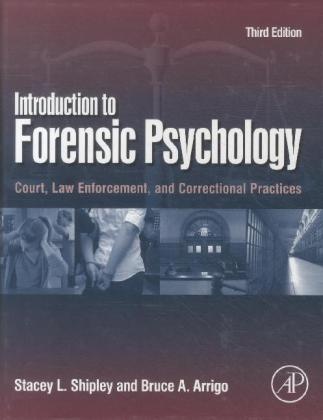Ulteriori informazioni
Introduction to Forensic Psychology, Third Edition, has been completely restructured to explain in greater detail how courses on forensic psychology are taught, making it more applicable as a textbook than previous editions. It also features more figures, tables and text boxes, making it a true textbook. What this book has that others do not is equal representation of criminal behavior, the court systems, and law enforcement/prisons. It also has equal representation of criminal and civil forensics. Other texts tend to be weighted towards just criminal behavior or just criminal justice and primarily criminal or civic forensics but not both.
This new edition also has equal representation of issues to pertaining to adults and children. It contains new coverage of cyberbullying, tests and assessments in the courtroom, mental deficiency and competency to stand trial, and information on mothers who kill their children. Adult, juvenile and family issues are dealt with separately, making it easier to find what you need. Case illustrations dramatically highlight how the lives of individuals have been (or could be) impacted by developments in psychology and law. Chapters now include pedagogy, including outlines, main points, and relevant websites.
This book is intended for professors teaching introduction to forensic psychology, as well as for students interested in adult, child, and family forensics as they apply to criminal and civic forensics law enforcement/prisons.
Sommario
Part I: Adult ForensicsCourt and the Legal System: Criminal Forensic EvaluationChapter 1 - Adult Forensic Evaluation
Court and the Legal System: Criminal Forensic ConsultationChapter 2 - Adult Forensic Consultation
Court and the Legal System: Civil ForensicsChapter 3 - Civil Forensics
Police and Law EnforcementChapter 4 - Adult Issues in Policing
Corrections and Prison PracticesChapter 5 - Adult Issues in Corrections Psychology
Part II: Juvenile ForensicsCourts and the Legal System: Delinquent ConductChapter 6 - Juvenile/Family Forensics
Court and the Legal System: Civil ForensicsChapter 7 - Juvenile/Family Forensics
Police and Corrections PracticesChapter 8 - Juvenile Issues in Policing and Correctional Psychology
Part III: Family ForensicsCourt and the Legal System: Criminal ForensicsChapter 9 - Violence in the Family
Court and the Legal System: Civil ForensicsChapter 10 - Family Forensics
Police and Law EnforcementChapter 11 - Family/Community Issues in Policing
Corrections and Prison PracticesChapter 12 - Family/Community Issues in Corrections/Correctional Psychology
ReferencesCasesIndex
Info autore
Bruce A. Arrigo is Professor of Criminology and Forensic Psychology and Director of the Institute of Psychology, Law, and Public Policy at the California School of Professional Psychology-Fresno. Prior to his career in academe, he was a community organizer and social activist for the homeless, the mentally ill, the working poor, the frail elderly, and the chemically addicted. He is the author of more than 60 journal articles, academic book chapters, and scholarly essays exploring theoretical and applied topics in critical criminology, criminal justice and mental health, and the sociology of law.
Riassunto
Offers equal representation of criminal behavior, the court systems, and law enforcement/prisons. This title covers emerging issues in forensic psychology. It is an expanded coverage of corrections for juveniles.

